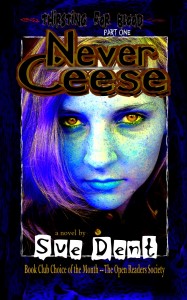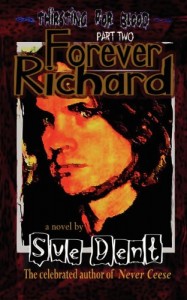Christian Versus Secular Novels
When I started out in publishing I’d never once heard the market divided up into the two very specific categories of Christian and Secular. Genres, yes, but not Christian or Secular.
 I’ve been involved with publishing for nearly seven years now. My work has appealed to a market I never knew existed as well as my target audience of general market readers. I can honestly say that after seven years I now “get” the distinction. Hopefully you’ll “get” it too, once I’m done with my guest column here at Speculative Faith.
I’ve been involved with publishing for nearly seven years now. My work has appealed to a market I never knew existed as well as my target audience of general market readers. I can honestly say that after seven years I now “get” the distinction. Hopefully you’ll “get” it too, once I’m done with my guest column here at Speculative Faith.
As with any writer, those things that shaped me as an individual show up in all my stories. That’s the defining difference from novel to novel in my opinion. You get a grand story and a glimpse at the person writing those stories.
My debut novel Never Ceese was very much a personification of some things I know a lot about. My granddaddy was an ordained Southern Baptist minister. He ordained my brother. I grew up Baptist and knew everything about “being” Baptist. Ergo, my vampire and werewolf are the offspring of a Baptist missionary.
Writing what you know about. That makes the job easier. Not so much research to get things right so you can concentrate on the story.
Straight away and especially after Never Ceese made the Bram Stoker Preliminary Ballot in 2007 for Superior Achievement in a First Novel, I began to hear from readers who favored work put out by Christian publishers. Even Eric Wilson, best-selling author of Fireproof, and published by the number one Christian publisher Thomas Nelson, left a favorable review of Never Ceese on Amazon. (The review mysteriously disappeared sometime last year, but has been re-posted with all my other reviews of Never Ceese on my website at SueDent.net.)
 Never Ceese was even allowed to tour at CFBA (Christian Fiction Blog Alliance) in spite of it not being published by a sanctioned CBA publisher. It was shortly after this when I learned first hand about Christian publisher’s “highly” targeted audience. When I went back to CFBA with the sequel to my debut novel, Forever Richard, to tour, my new Christian publisher (not sanctioned by CBA) and I were told “no.” Only CBA-sanctioned books would be allowed to tour from now on or at least books that were openly “evangelical” in nature.
Never Ceese was even allowed to tour at CFBA (Christian Fiction Blog Alliance) in spite of it not being published by a sanctioned CBA publisher. It was shortly after this when I learned first hand about Christian publisher’s “highly” targeted audience. When I went back to CFBA with the sequel to my debut novel, Forever Richard, to tour, my new Christian publisher (not sanctioned by CBA) and I were told “no.” Only CBA-sanctioned books would be allowed to tour from now on or at least books that were openly “evangelical” in nature.
After my publisher and I heard this, we actually felt silly for asking to tour. If we’d known the tour was for that “niche” market only, we would’ve never asked. The same thing happened when my publisher at the time approached the CSFF (Christian Science Fiction and Fantasy) blog tour. And no debate was welcome. We weren’t sanctioned so there was no guarantee the work would appeal to that “target” audience they’d set themselves up to serve.
Now back to the original theme: Christian verses Secular, and Sue Dent’s novels.
I don’t write for the “niche” market that chooses to use these two labels to define the publishing industry. I did tour CFBA with great success but that was by accident, apparently. No non-sanctioned work is welcome there any more, to the best of my knowledge.
I was also once a member of the American Christian Fiction Writers, the ACFW, until I realized their only purpose is to help aspiring writers find a home with a “sanctioned” or “evangelical” publisher who will completely re-write any manuscript until it fits what they’ve determined their “target” audience will buy. And I often jump right in on Christian publishing forums to help bring understanding to writers who ask questions of me in relation to my experiences in the publishing industry, an effort that is about as productive as using a tablespoon to fill a pool with water — with the drain open. That would almost classify as counterproductive, so I know longer make that offer.
So Secular or Christian?
Neither and both depending on your definition.
 A random website did vote Never Ceese as the #1 Christian Horror Novel. Ironically, most of the other authors on the list were CBA-sanctioned authors such as Ted Dekker and Frank Peretti. Just don’t look for Never Ceese in Christian Bookstores because it’s not put out by a publisher sanctioned to appeal to Christian bookstore visitors. Forever Richard was long-listed for British Fantasy Award in 2009 and Electric Angel got high marks from the BFS as well. “Simply Brilliant,” was the initial review scrapped for being too short.
A random website did vote Never Ceese as the #1 Christian Horror Novel. Ironically, most of the other authors on the list were CBA-sanctioned authors such as Ted Dekker and Frank Peretti. Just don’t look for Never Ceese in Christian Bookstores because it’s not put out by a publisher sanctioned to appeal to Christian bookstore visitors. Forever Richard was long-listed for British Fantasy Award in 2009 and Electric Angel got high marks from the BFS as well. “Simply Brilliant,” was the initial review scrapped for being too short.
All in all though, a writer needs distribution, and the only way to successfully get sales is to have a publisher with that kick-tail distribution already. The larger Christian publishers, much like the larger general market publishers, do have this.
 So if preach-to-the-choir fiction is what you want to write, you go right ahead and connect with one of those fine publishers. I write to be read by as many folks as I can appeal to. Niche markets are not the way to go for that, but I already knew that. I just didn’t know that Christian publishing was a niche market until I landed in the middle of it.
So if preach-to-the-choir fiction is what you want to write, you go right ahead and connect with one of those fine publishers. I write to be read by as many folks as I can appeal to. Niche markets are not the way to go for that, but I already knew that. I just didn’t know that Christian publishing was a niche market until I landed in the middle of it.
I really don’t mind if a reader chooses to call my work Christian Fiction based on their opinion. But if you’re inclined to do so, and you’ve read this column, I would love for you to add, “but not that kind of Christian Fiction.” Believe it or not, it does help readers understand.







































Will look for these!
Thanks for the article. Now I’m intrigued and have to look for your books. Speaking from strictly a reader’s viewpoint, I don’t fit very well in the “target” audience as I don’t care for Amish or romance and very little historical so I appreciate what you are saying.
By the way, each of Sue’s novels are linked above, and can also be found here:
Speculative Faith Library — Sue Dent
Each of those pages also includes Amazon links. 🙂
And direct links at the publisher’s site are as follows:
http://downwarden.com/blackbedsheetstore/index.php?main_page=product_reviews_info&products_id=300&reviews_id=3
http://downwarden.com/blackbedsheetstore/index.php?main_page=product_info&cPath=81_113&products_id=309
http://downwarden.com/blackbedsheetstore/index.php?main_page=product_info&cPath=81_113&products_id=306
Here they are available in any e-book format. There are no kindle versions on Amazon. I don’t agree with the way Amazon handles their kindles. Takes the money away from the publisher etc . . . Kindle versions and all other ebook versions available at publisher’s site.
Thanks for any and all support.
Thank you Cindy. And you don’t have to look hard for my books, they are available wherever books are sold. Since Independent authors don’t qualify for the kind of distribution larger publishers get through the bigger distributors, you won’t likely find them sitting on any bookstore shelf. You’ll have to order them until they start selling to a point where larger bookstores go hmmmm . . . You won’t ever find them on a Christian bookstore shelf though even though I do appeal to many readers who shop there because my work isn’t targeted specifically for that market therefore the content doesn’t meet their strict content guidelines (which do vary from publisher to publisher but not by much.)
It is funny that you mentioned the Amish romances this market puts out. I have an account at shoutlife.com a FINE “family friendly” social network and the question was asked to other members concerning their feelings towards these Amish Romances. One fine commenter replied: “Well, I like stories about the Amish but typically when I read a story about the Amish, I like it to be about the Amish.” So perhaps you’d enjoy an Amish romance that was specifically about the Amish. 😉
All in all, it’s helpful for readers to know, at least in my case, that when readers from a niche market enjoy your work, it doesn’t mean you write specifically for that niche market.
If any stock is put into the words from the Horror Writers Association, the British Fantasy Society and even best-selling authors from this niche market such as the wonderful Lena Nelson Dooley, then you’d definitely enjoy my books. I prefer folks purchase them through my publisher though simply because distribution is lame with Indies and the reader gets the BEST price that way.
Love my readers from this market. Love all my readers. It’s why I write.
Thank you Sherwood, but you don’t have to look far. Just don’t expect to see them in any Christian on-line stores that only list work put out by sanctioned publishers. And yes, that’s a big DUH! LOL Other non-sanctioned Christian sites will list it. The distribution most Independent presses have makes it better for the reader to purchase straight from the publisher. I offer autographed copies on my site at SueDent.net. 😉
This is a no holds barred, tell it like it is article – fearless. I forgot that word.
I am proud to read your publishing struggle here and on Facebook. Potential writers seem to have no idea what is in store. I consider you and others such as Frank Creed to be pioneers. You love God, you write what is in your heart and in your case, you are recognized by people outside the Christian community.
I’m sharing where I can.
Thanks for the compliment, Chris! Lost Genre Guild: http://groups.yahoo.com/group/lost_genre_guild/
. . . because you RAWK Chris D.! And I must say, I appreciate the heck out of friends like you who are struggling right along with me to get out there and to let readers know and hope they keep in mind that the label Christian in publishing as come to denote a fraction of publishers who serve a very targeted and denominational market. I’ve seen soooooo many writer friends waste a LOT of time, energy and sanity thinking otherwise. But just as it is in publishing, you need to investigate EVERY publisher to see EXACTLY if that’s where you want to be. And keep in mind, some don’t do a real good job of letting you know until it’s too late.
And lest I forget, thank you Mr. E. Stephen Burnett for offering me this spot! I feel the winds of change or rather acceptance. You are the man of the hour as far as I’m concerned. Thanks so much!
Why thank you much for the encouragement, Sue.
I am curious about what sort of Baptist denomination you have in your history. American Baptist? Southern Baptist?
Did you grow up with default (often unspoken!) opposition to fantasy/paranormal stories, or was that view unknown to you?
I ask because your angle is highly interesting to me: that you didn’t even know about the “Christian market.” This seems to lend credence to your perspective on this market. It does not sound like you began writing as a reaction to this potential insularity, but only found that division once you had begun.
I hasten to say that many fantastic and faith-based novels are not nearly so insular or cliched. Not only is the “traditional” market itself changing, but as far as I am concerned the “traditional” market must now stretch its definition to include Marcher Lord Press, Risen Books, Splashdown Books, and any other independent God-honoring fantastic fiction publisher or author whom I may have left out. 🙂
First question: Well, I’m in Mississippi, so clearly that would be Southern Baptist. At around age thirteen my parents broke ties and we joined a Charismatic church or non-denominational NOT pentecostal. It was wonderful experience.
Second question: There was always a prodding to stay away from certain things by my parents and Sunday School teachers etc, enough so that I carefully approached writing about vampires and werewolves but mainly because I didn’t want to distance my possibly evangelical friends. After all, I saw them as an audience too. 😉 Other than that, I don’t think you could call me insulated as, (thank God) my mother allowed us to watch Dark Shadows which influenced me greatly. I fell in love with Barnabus Collins!
The Christian Market as it is known today came into existence in 1950 when Baptist Bookstores decided they wanted to provide targeted fiction for their store visitors because they thought general market fiction was too “secular.” I didn’t learn all of this UNTIL after I began publishing and after readers from that market began enjoying my work. Very few understand the absolute targeted nature of this market because most are accustomed to seeing this applied label in the broader sense, meaning ALL faiths are considered. So while I’d most likely heard of the Christian market, there was absolutely never any reason for me to assume it was targeted denominationally and “very” specifically. Nothing like being denied access when you’re a person of faith as well. Fine if you’re not “that” person of faith. LOL
And the general market has never had a problem embracing Christian niche market presses. But Christian niche market publishers seem to have a very real problem defining their market to readers and potential authors. Some of those publishers may not be as “niche” as others but they’re still a niche and they should be proud of who they write for instead of attempting to lure readers in with false hope of great general market fiction. It sort of works against them in the end. IMO But there’s no reason for them to listen to me. LOL
You still rawk though. 😉
Mr. Burnett, I so appreciate you taking a chance to talk about work that doesn’t fall within certain boundaries or expectations.
Thanks for your encouragement, Chris.
I agree that artificial, often un-Biblical boundaries are not helpful. My desire is that we tear them down as a start, to replace them with hopes for God-honoring stories that reflect Him, people, and His world, with or without specific mentions of Him or faith.
Speculative Faith will reach out, and has reached out, to any similar author — thanks especially to the efforts of editor and regular columnist Rebecca LuElla Miller. It may be that such authors simply haven’t “found us” yet, or vice-versa. We have, however, featured authors such as Merrie Destafano, who writes urban fantasy in the general market, and R. J. Anderson, who writes fairy tales, also in the general market.
Of course, suggestions are always welcome, such as by using the Suggestion Box!
I don’t think it’s about general market authors finding Speculative Faith or other such blogs. I think it’s more about authors not wanting to limit potential buyers to just those from a “targeted” audience. God-honoring stories that reflect Him, people, and His world, with or without specific mentions of Him or faith,” is in itself a limiting statement. Many faiths have differing ideas than this when it comes to fiction so the agenda isn’t all encompassing of “Christian.”
Other than that, books with this very thing in mind are written every single day in the general market. It’s nothing new. What isn’t written every day are books with a specific denominations guidelines in mind. That’s a niche market and is a wonderful thing. It helps readers find what they’re looking for. C. S. Lewis wrote for the general market. I very much suspect that if he were alive today and had the choice, that he wouldn’t want his book showing up on blog sites or in bookstores that are specific to one specific denomination. Of course CBA and evangelical publishers weren’t around at the time so general market was the only route he had to go, with his genre being Fantasy, (a genre most Christian Fiction publishers don’t even care to touch because they know it won’t sell to their target market.)
Sanctioned Christian Fiction publishers, and many who aren’t sanctioned, only create work for a very targeted audience. Perhaps inside their camp there are walls that should come down and I hope they have some luck in discussing how to bring them down, but general market publishers have always provided and will continue to provide work that appeals to all audiences with the work being broken up into genres or niche markets if you will.
Also, there’s a very good possibility that Anne Rice may show up to add some discussion to this subject. And wouldn’t that be grand as I’ve always felt her move toward writing more faith-based fiction should’ve been heralded as a grand and glorious moved by this very market that has pretty much shunned her and has done nothing to welcome or embrace her. *Sue shakes head back and forth.* Such a shame.
That depends on how you look at it.
When I made that statement, I was thinking both of Christ the Savior being reflected in “specific,” even “niche,” books by and/or for Christian readers, and God the Creator being reflected in general-market stories, Greek poets (Acts 17:28) if you will, that echo God’s existence. (See also: even fallen creation praises God, as in the Psalms. Worship is not only singing in church. It encompasses all of life — Col. 3:23.)
“General” or “secular” stories may certainly echo the existence of God and/or moral law, good and evil, heroes and villains. Every story in some way builds on the Story of reality. Every good story glorifies God. Some do more than others.
To say it differently, some stories are in effect “altars to the unknown God.”
Yet Christian authors may, if they choose, come along and say, “What therefore you worship as unknown, this I proclaim to you” (Acts 17:23), and do this beautifully.
That is what I meant. I wonder what you thought I meant? Perhaps that recurring impulse that “glorifying God” means only specific “spiritual” elements such as church attendance, Bible reading, or evangelism? If so, that is a flawed definition.
So far, I haven’t read Sue‘s books. Yet if she wrote them “from faith” (Romans 14:23), I suggest they glorify God no matter their audience or publisher(s).
As for the mentions of “denominations,” I am not sure how those relate. As far as I know, Christian denominations disagree over church structure, names, traditions, rites and rituals, end-times theology, outreach methods, and much else. I have not seen denominations quarrel over defined beliefs of how God is glorified. Over and above other doctrinal issues, He set this forth very clearly in Scripture.
This teaching does not enslave us to droning, dutiful acknowledgment that we must slavishly give God credit in all we do. It sets us free: to live, sing, delight, and create.
I do appreciate the history lesson about the modern “Christian market.” I believe it has inherited some wrong notions about “being a counter-culture.” The solution to this is more Biblical teaching on the subject, to be lived out in our life callings.
Briefly on Anne Rice: I recall a front-page feature in World Magazine, an evangelical weekly, that was an excerpt from her novel about the life of Jesus. It was fascinating writing. While being faithful to Scripture, she also imagined what it would have looked and felt like to be Jesus in the desert, tempted by the Devil to work His own will instead of the will of His Father — distracting Him from His true calling.
Then again, World Magazine hails from more of the Biblical Reformed/Lutheran view of vocation and cultural engagement, which I have eagerly adopted because of its firm Scriptural basis. Oddly enough, though, we have not seen moves toward promoting better fiction from these sorts of Christians. That may be on the way.
What I think is meant by the statement “God-honoring stories that reflect Him, people, and His world, with or without specific mentions of Him or faith,” are targeted stories written for a very specific audience. And being that, I suggest a more specific label to better define. Taking on a broad label such as Christian suggests that the “fiction” will appeal to oh so many readers of Faith when in fact it doesn’t.
I am a Christian, in the broader sense of the word, yet my work doesn’t qualify to be published by a “Christian” publisher? Because I understand how the modern “Christian” market evolved, I know why my work doesn’t qualify. It doesn’t meet strict guidelines set forth to protect a targeted denominational audience.
It’s all good. Niche markets are wonderful and important but readers deserve to know what they’re picking up before they pick it up. Writers deserve to know who they’re submitting to before they waste A LOT of time submitting.
Folks like yourself seem to want to establish that Christian Fiction is something entirely different now and that’s fine. But while it may be different than it once was and not as targeted . . . it’s still very targeted. My work, already successful on some very big levels, was turned down by each of the publishers you suggested in a previous post were open to being less targeted. This was slightly unnerving to say the least. But I’ve moved on.
God is a big part of who and what I am. Of course, everything I do will reflect that. It is sad that I and many other writers are “turned down” hand over fist by those who indicate that they have a genre to honor Him. It is a shame that readers of Faith seek out this genre only to find watered down targeted fiction that might very likely offend them based on their belief system.
Do things need to change? Yes. Will they? I doubt it.
is in itself a limiting statement.
This is one reason I think the term “Christian fiction” is nonsensical. It really adds no value to the discussion of what defines “Christian art” – so my position is that there is no such thing as Christian art. A novel, song, painting, whatever, is either moving toward the truth of the gospel or away from it. Good timing, though, Sue (I just posted on this issue yesterday and quoted Becky on what she feels does define Christian speculative fiction, but can’t find her original source). I appreciate your post here calling into question that very concept. At least that’s how I’m reading your post.
Yes sir, Lyn. 😉 You’ll have to thank Mr. Burnett for the timing. He asked if I wanted to post something on October the 5th and . . . well . . . I couldn’t turn that down.
Sue:
Great post! I’m definitely going to check out your novels. I was raised Southern Baptist as well. 🙂
In some ways, it might be better that the large Christian publishers aren’t interested in Christian spec novels. If we want to bring God’s message to people, then we need to appeal to the general public, not just Christians. I went to Half-Price Books the other day and it took me forever to find the Christian fiction section. It’s not even near the rest of the literature; it’s filed under religion in the non-fiction section. How sad is that? Unless you’re Christian, you’re not going to find it. You’re certainly not going to happen on it by chance. However, there are plenty of books that deal with religious issues in “secular” books. These authors write about religion unashamedly, not necessarily in a positive light. It seems like it is the secular audience that we want to reach for God.
It sure would be nice to have a large publishing house wanting to publish us, though.
Large publishing houses “not” publishing folks has nothing to do with what the book is about though. That has to do with a entirely “nuther” issue which is and that’s market. Large publishers aren’t going to publish work for a niche market because they need stories that appeal to the broader audience. But even at that, they do pick up fine Christian writers all day long. An example; Mississippi’s own John Grisham. Biggest Baptist you’ll ever find. Active in his church and outspoken about his Faith. His work may not directly glorify God but he’d never write anything that didn’t glorify God. So there ya go! 😉
Poor self-published William P. Young, author of The Shack merely met destruction when Christian Bookstores started carrying is non-CBA sanctioned Christian Fiction (for all intents and purposes) novel The Shack. Poor, poor William. I’m sure if he had that to do all over again he would do it another way. It’s not the large publishers who are doing the most damage here. That book moved folks in the general market but got stomped all over by those who are constantly saying that publishers won’t publish their authors.
If Mr. Young has put out another book, I sure haven’t heard about it AND THAT’S SAD!
I find this entire discussion really encouraging. I’d love to market my YA novels in the secular arena, but they do have a smattering of Christianity in them (because the characters are Christians). I’d wondered if that might keep a ABA publisher/agent from looking at them, but if what you say is true, then I shouldn’t have anything to worry about. As long as the story is good and the male protagonists are “swoon-worthy”. 😀
Just keep in mind Kessie that the labels Secular and Christian don’t mean the same thing as they do in when talking amongst those who operate within Christian publishing. In the publishing world outside this niche market it’s General Market or rather mainstream. Most of general market publishers are only interested in if your characters are “real” and not contrived. My publisher, Black Bed Sheet Books operated by Nicholas Grabowsky who penned Halloween IV actually came to me after reading my novel Never Ceese and after watching the sequel Forever Richard, and after I lost my second publisher to the dreaded “non-industry” standard return policy to say that he should publish me. He has also published Bart Brevik whose wonderful Christian Horror novel fell on empty ears as far as Christian Publishers go. Nicholas took up his work without question.
Also general market doesn’t designate the market as ABA and CBA. That’s a CBA thing. ABA is an association that helps Independent Publishers get into bookstores where large publishers dominate. CBA is a niche market of Christian Publishers who write for a targeted audience, specifically evangelical in nature with some publishers being a little more stringent with the guidelines than others. All non-niche publishers shy away from anything that reads like it’s intended for a niche market. They want the stories they put out to get as many readers/sales as possible. 😉
I also live on FB most of the day while I’m writing. Do pop in and say hello if you get the chance. 😉 https://www.facebook.com/authorsuedent
Bryan Davis, author of the Dragons in Our Midst series, said that secular publishers called his first novel “too Christian” and Christian publishers called it “too weird.” He ended up getting published by a publisher that accepted his parenting book, even though they didn’t do fiction previously.
I did a booksigning at a Barnes & Noble with Bryan Davis. He encouraged me to send my novel Never Ceese to his first Christian Fiction publisher because they were “very open” and looking for work like mine. They turned me down in ten seconds flat. Said their “target” audience wouldn’t read about vampires so they didn’t publish such things. Bryan has always had either an official and sanctioned Christian Fiction publisher or “evangelical” publisher. It’s easy to write for kids in that market and appeal to general market readers. Bryan’s a great guy! Really enjoyed meeting him.